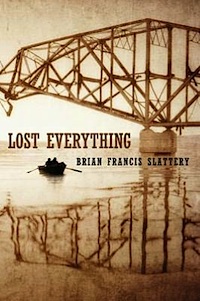Brian Francis Slattery’s latest novel Lost Everything, out today, is a deeply dark and disconcertingly dire peek into a future where the end of the apocalypse never comes. Waves of horror and tragedy ebb and flow with the whims of a vengeful planet while the people left scrambling on her surface wage a pointless and inexplicably persistent war. To say that the book is bleak is to miss the point entirely, but rest assured this is not a tale of happy endings.
Lost Everything is told in three parts: The River, which centers around Sunny Jim, “a stained photograph of another man,” and Reverend Bauxite as they sail up the Susquehanna in search of Jim’s young son Aaron; The Highway, which centers on four of the soldiers fighting guerrillas like Jim’s missing and probably killed-in-action wife Aline and who are on the hunt for Jim and the Rev; and The House, which centers on Jim’s emotionally vacant sister Merry as she tries to protect Aaron until his father returns.
The story, the elegiacal way Slattery constructs it, is restless and relentless. The sections weave in and out of each other, and in the midst of all of this is the person stitching the disparate parts together, the unknown, unnamed narrator telling this Homeric epic to their eagerly listening audience. We don’t know how far into the future the narrator is telling their tale, but it leaves a glimmer of hope. Maybe this too shall pass, maybe we can all make it out of here alive, maybe…maybe…
No one can remember how the war started or how the sides were initially drawn up, but by the time the soldiers are after Sunny Jim and the Reverend, none of that matters. What’s left is survival and control. The army fights because it has not yet been told to stop, and its conquered territories resist because you have to have an opposing force in order for a war to work. Looming in the background of all of this is the Big One, a storm to outdo all other storms, the one the world has been waiting for, “a boiling wall of clouds, gray and green and sparked with red lightning, and underneath it, a curtain of flying black rain, rippling with wild wind from one end of the earth to the other.”
All the characters have old-timey names, like Slattery went through a book of baby names from the 1930s. It is fitting in an ironical way. The backdated names and archaic traditions the characters espouse (such as celebrating with harvest festivals and bands of survivors dancing jigs to while away the night) give the dystopian future a humanistic feel and contradict the common cliché that our fate is sealed by sentient machines rather than our own nihilistic fancies. It also harkens back to the Great Depression when America came closer to doom than most people realize. We weren’t just balancing on a razor’s edge, we were already halfway over. And it took an even greater catastrophe—WWII—to spare us. You and I are here today because millions upon millions of people fought and resisted and suffered and died. And yet here we stand on another precipice, this one spanning climate change and economic disaster. Will it take another war to pull us out of the depths or will it push us under even further? Are we the narrator telling the story with the security of hindsight or are we Reverend Bauxite and Sunny Jim with our backs against the wall as the storm encroaches?
Slattery’s story isn’t really a story at all but a collection of pieces of many people’s stories. Bits and bites, drips and drabs, lost memories unearthed, forgotten emotions rekindled. Shadows of friends and lovers and enemies and families echoing in the barren landscape. Burned out husks of civilization emptied of life and roiling with the screams of ghosts. It’s a book of beginnings, of prologues, of things starting to happen. That’s what life is. There are no middles, just a series of never-ending starts and one massive, permanent end. There is no curtain call, just a constant loop of entrances and exits, of rememberings and retellings, of despair and hope.
The description on the back of my advance uncorrected proof likens the saga to 1984 and The Hunger Games, but Lost Everything‘s closest cousin is Cormac McCarthy’s The Road. It is half told in narrative prose, half in dialogue, jumping breathlessly from perspective to perspective, first to third person, dreams and memories to realities and experiences. Like McCarthy, Slattery often eschews quotation marks and traditional grammatical and parenthetical structure for authorial style and literary license. And like McCarthy he does it with aplomb and without being jarring, grating, or quirky. There is also a dash of China Miéville and Neil Gaiman in his words. A flicker of lyrical poetry and a lilt to his words that make it impossible to speed through or skip over. Not that you’d want to anyway. Lost Everything is the sort of book you think you can read on the bus to work or while waiting for the dryer to chime. But instead it drowns you gradually, drop by drop, until you’ve lost whole swaths of time.
If I haven’t yet managed to convince you to read Lost Everything, maybe this excerpt will get you moving.
Alex Brown is a research librarian and archivist by day, writer by night, and all around geek who watches entirely too much TV. One of these days she will go out and have a life, but until then at least she a hoopy frood who knows where her towel is. You can follow her on Twitter if you dare.










